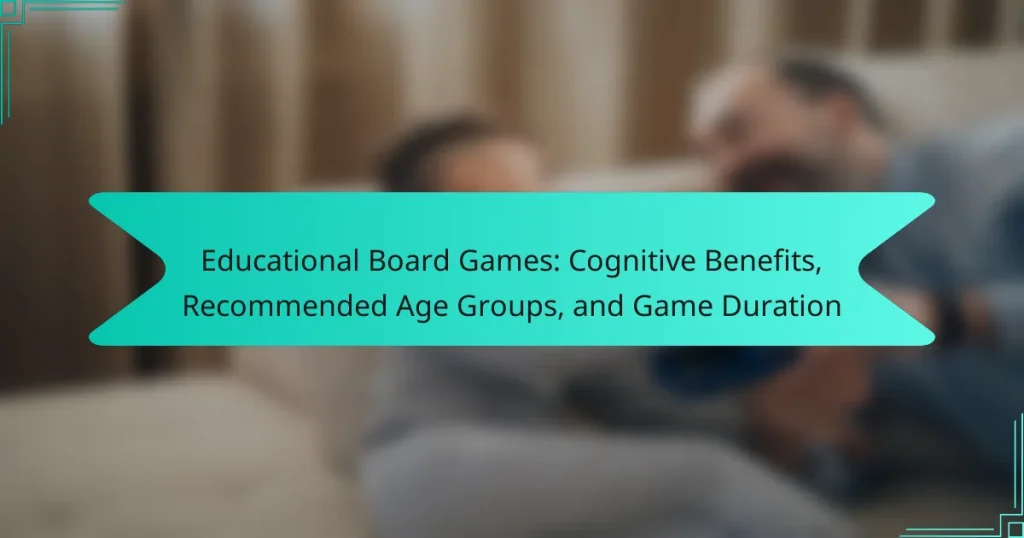Educational board games are interactive tools designed to teach players specific skills or knowledge in subjects such as math, science, language, and social studies. These games promote critical thinking, problem-solving, and teamwork, making them effective for cognitive development across various age groups, from preschoolers to adults. The duration of these games typically ranges from 30 minutes to 2 hours, depending on their complexity and the number of players involved. Research indicates that age-appropriate educational board games significantly enhance learning outcomes and knowledge retention, providing a fun and engaging way to learn.

What are Educational Board Games?
Educational board games are games designed to teach players specific skills or knowledge through interactive play. They often focus on subjects like math, science, language, or social studies. These games engage players in critical thinking and problem-solving. Many educational board games incorporate elements of strategy and teamwork. Research shows that such games can enhance cognitive development in children. For instance, a study published in the journal “Child Development” indicates that educational games improve learning outcomes. Overall, educational board games serve as a fun and effective learning tool.
How do Educational Board Games differ from traditional board games?
Educational board games focus on teaching specific skills or knowledge, while traditional board games prioritize entertainment. Educational games often incorporate elements like quizzes or challenges that promote learning. They target cognitive development in areas such as math, language, or critical thinking. Traditional board games usually emphasize strategy, luck, or social interaction without an educational objective. Research shows that educational games can improve retention of information by engaging players actively in the learning process. In contrast, traditional games might not offer the same cognitive benefits.
What key features define an Educational Board Game?
Educational board games are defined by their ability to combine fun with learning. They typically incorporate educational content that teaches specific skills or knowledge. Common features include clear objectives that align with educational goals. Many games promote critical thinking and problem-solving skills. Interaction among players fosters social skills and teamwork. These games often include elements of competition to engage players. Additionally, they are designed for various age groups to cater to different learning stages. Finally, educational board games usually feature rules that are easy to understand, ensuring accessibility for all players.
Why are Educational Board Games important for learning?
Educational board games are important for learning because they engage players in active problem-solving and critical thinking. These games promote cognitive skills such as memory, attention, and strategic planning. Research shows that playing educational board games can enhance social skills through teamwork and communication. Additionally, they provide a hands-on learning experience that reinforces concepts in a fun context. Studies indicate that children who play educational games perform better academically compared to those who do not. The interactive nature of these games makes learning more enjoyable and effective. Overall, educational board games serve as valuable tools in the learning process.
What types of cognitive benefits do Educational Board Games provide?
Educational board games provide various cognitive benefits, including improved problem-solving skills, enhanced critical thinking, and better memory retention. These games often require players to strategize and make decisions, fostering analytical abilities. Research shows that engaging in such games can lead to increased cognitive flexibility, allowing players to adapt their thinking to new information. Additionally, educational board games promote collaboration and communication skills, as players often work together or compete in teams. Studies indicate that regular engagement with these games can enhance overall cognitive development, particularly in children.
How do these games enhance critical thinking skills?
Educational board games enhance critical thinking skills by requiring players to analyze situations, make strategic decisions, and solve problems. These games often present complex scenarios that challenge players to think critically and evaluate multiple outcomes. Players must assess risks and rewards, which fosters logical reasoning. Engaging in discussions during gameplay encourages collaboration and diverse viewpoints. Research indicates that children who play strategy-based games demonstrate improved cognitive flexibility and problem-solving abilities. A study by the University of Colorado found that students who regularly played educational games scored higher in critical thinking assessments.
In what ways do Educational Board Games improve problem-solving abilities?
Educational board games enhance problem-solving abilities through strategic thinking, collaboration, and critical analysis. Players must assess situations, develop strategies, and adapt to changing scenarios. These games often present challenges requiring logical reasoning and decision-making skills. For instance, games like “Settlers of Catan” encourage resource management and negotiation. Research shows that engaging in these activities can improve cognitive flexibility and analytical skills. A study by the University of Chicago found that children who play educational board games score higher on problem-solving tests compared to those who do not. This demonstrates the tangible benefits of board games in developing essential problem-solving skills.

What are the recommended age groups for Educational Board Games?
Educational board games are recommended for various age groups, typically ranging from preschoolers to adults. For preschoolers aged 3 to 5, games focus on basic skills like counting and color recognition. Children aged 6 to 12 benefit from games that develop critical thinking and problem-solving abilities. Teenagers aged 13 to 18 can engage in more complex games that encourage strategic planning and teamwork. Adults can also enjoy educational board games that promote cognitive skills and social interaction. Research indicates that age-appropriate games enhance learning and retention of knowledge across all age groups.
How do age recommendations vary among different Educational Board Games?
Age recommendations for educational board games vary significantly based on complexity and target learning outcomes. Many games are designed for specific age groups, often indicated on the packaging. For example, games aimed at preschoolers typically recommend ages 3-5. These games focus on basic skills like counting and color recognition.
In contrast, games designed for older children, such as those for ages 8-12, often introduce more complex strategies and critical thinking. These games may involve math, reading comprehension, or science concepts. Some games even target teenagers or adults, focusing on advanced topics or collaborative problem-solving.
The differences in age recommendations reflect the cognitive and developmental stages of children. They ensure that the games are age-appropriate and beneficial for learning. Research shows that engaging with age-appropriate educational games enhances cognitive skills effectively.
What factors influence the suitability of games for specific age groups?
The suitability of games for specific age groups is influenced by cognitive development, content appropriateness, and complexity level. Cognitive development varies significantly across age groups, affecting how children understand rules and strategies. Younger children often require simpler mechanics and visual aids to grasp concepts. Content appropriateness ensures that themes and messages align with the values and understanding of each age group. For instance, games with violent themes are unsuitable for younger players. Complexity level refers to the rules and strategies involved in gameplay. Games for older children may include more intricate rules and strategic thinking, which younger players may find overwhelming. Research by the American Psychological Association highlights the importance of age-appropriate content in enhancing engagement and learning outcomes.
Are there Educational Board Games designed for multiple age ranges?
Yes, there are Educational Board Games designed for multiple age ranges. Many board games incorporate adaptable rules or levels of difficulty. These features allow players of varying ages to engage meaningfully. For example, games like “Scrabble” and “Catan” have versions or modifications suitable for children and adults. Research indicates that such games enhance cognitive skills across age groups. They promote critical thinking, problem-solving, and social interaction. Educational board games can foster family bonding while catering to different learning needs.
What age-specific benefits do Educational Board Games offer?
Educational board games provide various age-specific benefits. For preschoolers, these games enhance basic skills like counting and color recognition. They promote social skills through cooperative play. For elementary-aged children, games improve critical thinking and problem-solving abilities. They also support literacy development through reading and comprehension tasks. Middle school students benefit from strategic planning and teamwork skills. These games can foster a competitive spirit while teaching sportsmanship. High school students can enhance analytical thinking and decision-making skills through complex game mechanics. Research indicates that educational games can lead to improved academic performance across age groups.
How do these games cater to the developmental stages of children?
Educational board games cater to the developmental stages of children by promoting cognitive, social, and emotional skills. These games are designed to align with specific age-related abilities. For example, younger children benefit from games that enhance basic counting and color recognition. As children grow, games introduce more complex strategies and problem-solving tasks.
Research indicates that interactive play fosters communication skills. Games that require teamwork encourage collaboration and social interaction. Additionally, many board games incorporate storytelling elements, which aid in language development.
According to a study published in the Journal of Educational Psychology, children who engage in board games show improved executive function skills. This includes better memory, attention, and self-regulation. Thus, educational board games effectively support various developmental milestones in children.
What role do Educational Board Games play in [censured] learning?
Educational board games enhance [censured] learning by promoting engagement and critical thinking. They facilitate collaborative learning experiences among participants. Players often develop problem-solving skills through strategic gameplay. Research indicates that these games can improve cognitive flexibility and adaptability. According to a study published in the Journal of Educational Psychology, adults who engage in board games exhibit higher retention of information. This is attributed to the interactive and immersive nature of gameplay. Additionally, educational board games can foster social interaction, which is vital for [censured] learners. Overall, they serve as effective tools for enhancing knowledge retention and skill development in [censured] education.

What is the typical duration of Educational Board Games?
The typical duration of educational board games ranges from 30 minutes to 2 hours. This duration varies based on the complexity and design of the game. Simpler games often last around 30 to 45 minutes. More intricate games may take up to 2 hours to complete. Additionally, factors such as the number of players and their familiarity with the game can influence the duration. Research shows that players tend to engage longer with games that offer deeper cognitive challenges.
How does game duration impact the learning experience?
Game duration significantly impacts the learning experience by influencing engagement and retention. Shorter games often maintain higher levels of player attention. Research indicates that attention spans can decline after 20-30 minutes. Conversely, longer games may allow for deeper exploration of concepts. However, they risk losing players’ interest if not designed well. Studies show that games lasting between 30-60 minutes strike a balance between engagement and cognitive load. This duration supports effective learning while minimizing fatigue. Therefore, game duration plays a crucial role in optimizing educational outcomes.
What are the average playtimes for various Educational Board Games?
The average playtimes for various educational board games typically range from 30 to 120 minutes. Games like “Scrabble” average around 50 minutes. “Ticket to Ride” usually takes about 60 minutes to play. “Catan” typically lasts around 90 minutes. “Blokus” has a shorter average playtime of about 30 minutes. “Rush Hour” can be completed in approximately 15 to 30 minutes. These times can vary based on player experience and the number of participants.
How can game duration be adjusted for different learning environments?
Game duration can be adjusted for different learning environments by modifying the time allocated for gameplay. Shorter durations may be suitable for younger learners or environments with limited attention spans. Longer durations can benefit older students or settings that allow for deeper engagement.
Game rules can include time limits to facilitate quicker rounds in fast-paced environments. Alternatively, flexible rules may allow for extended play in more relaxed settings. Adjusting the number of rounds can also influence overall game duration.
Research indicates that shorter sessions can enhance retention in younger players, while longer sessions may promote critical thinking in older students. For instance, a study by Hwang and Chang (2011) highlights how game length impacts learning outcomes.
What strategies can enhance the effectiveness of Educational Board Games?
Incorporating clear learning objectives enhances the effectiveness of educational board games. This ensures that players understand the educational goals. Engaging players through interactive gameplay increases retention of knowledge. Studies show that active participation leads to better learning outcomes. Providing feedback during the game reinforces concepts and encourages improvement. Utilizing diverse game formats caters to different learning styles. Research indicates that varied approaches can enhance engagement and understanding. Finally, encouraging collaboration among players fosters social skills and teamwork. These strategies collectively improve the educational value of board games.
How can educators select the right games for their learning objectives?
Educators can select the right games for their learning objectives by aligning game mechanics with educational goals. They should first identify the specific learning outcomes desired, such as critical thinking or collaboration. Next, they can evaluate games based on their cognitive benefits, which are often detailed in research studies. For example, games that promote strategic thinking can enhance problem-solving skills. Additionally, educators should consider the recommended age groups to ensure the game is appropriate for their students. Game duration is also crucial; shorter games may suit younger learners, while longer games can engage older students. By matching these attributes with their objectives, educators can make informed choices.
What tips can improve engagement and learning outcomes during gameplay?
To improve engagement and learning outcomes during gameplay, incorporate interactive elements. Interactive elements can include discussions, role-playing, or hands-on activities. These strategies foster active participation and enhance comprehension. Set clear objectives for each game session. Clear objectives help players understand the learning goals. Use a variety of game formats to cater to different learning styles. Varied formats keep the experience fresh and engaging. Provide immediate feedback during gameplay. Immediate feedback allows players to adjust their strategies and improve. Encourage teamwork and collaboration among players. Collaboration promotes social skills and deeper understanding of content. Lastly, assess outcomes post-gameplay to measure learning effectiveness. Assessing outcomes helps identify areas for improvement and reinforces knowledge retention.
Educational board games are designed to teach specific skills and knowledge through interactive play, enhancing cognitive development in players. This article explores the cognitive benefits of these games, highlighting how they differ from traditional board games, and detailing their key features, including age recommendations and typical game durations. Additionally, it discusses the impact of game duration on learning experiences and offers strategies for selecting and implementing educational board games effectively in various learning environments. Overall, educational board games serve as valuable tools for fostering critical thinking, problem-solving abilities, and social skills across different age groups.




